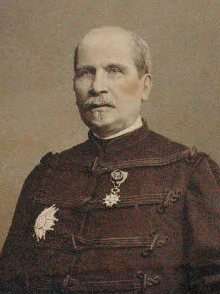Eugène Arnaudeau
| Eugène Jean Marie Arnaudeau | |
|---|---|
 General Eugène Arnaudeau | |
| Born |
8 September 1821 Laon, Aisne, France |
| Died |
3 May 1891 (aged 69) Sèvres-Anxaumont, Vienne, France |
| Nationality | French |
| Occupation | Major General |
| Known for | Senator |
Eugène Jean Marie Arnaudeau (8 September 1821 – 3 May 1891) was a French army officer who later became a Senator of the Third Republic.
Birth and military career
Eugène Jean Marie Arnaudeau was born on 8 September 1821 in Sèvres-Anxaumont, Vienne. He graduated from the Ecole polytechnique and became an officer of the engineers. He advanced steadily through the ranks of the army, becoming sub-lieutenant in 1843, lieutenant in 1845, captain in 1849, battalion commander on 17 January 1855 and lieutenant colonel on 21 January 1860.[1] In 1861 he married Marie-Félicité Creuzé.[2]
Arnaudeau was promoted to colonel on 16 May 1863 and brigadier general of the infantry on 27 February 1868. His first campaigns were in Africa. On 7 June 1865 he was made a Commander of the Legion of Honour. During the Franco-Prussian War (19 July 1870 – 10 May 1871) he commanded a brigade in the 3rd Corps under Bazaine. After this he commanded the Angoulême brigade. He was made a divisional general on 30 December 1875 and commanded the 16th Infantry Division, including the subdivisions from Cosne, Bourges and Nevers.[1]
Political career
In 1877 Arnaudeau was Conservative candidate in the senatorial by-election for Vienne that followed the death of Louis Olivier Bourbeau, former Minister of Education. He was elected on 2 December 1877. He sat on the right and voted with the Conservatives. He was reelected on 8 January 1882.[1] He made his last speech in 1889 during the debate over the amnesty law. Arnaudeau failed to be reelected to the Senate on 4 January 1891, and retired.[3]
Home town
Arnaudeau owned the property of "La Brunetière" in Sèvres-Anxaumont, Vienne. While in the military he used his leave periods to improve the mansion, adding a tower from which he could use powerful binoculars to watch the military maneuvers at Poitiers. In 1876 he erected a building in Sèvres to hold the town hall, school and teacher's residence, with a garden. He was made mayor of Mayor of Sèvres in 1888.[2] He undertook agricultural experiments, trying to apply scientific concepts of the age.[3] These included applying lime to the land, and a lime kiln still exists at Sèvres today.[2] He died there on 3 May 1891.[3] With no descendants, he left all his property to the commune.[2]
References
Citations
Sources
- "Général Arnaudeau". Patrimoine sadébrien. Retrieved 2014-01-07.
- Jolly, Jean (1977). "Arnaudeau (Eugene, Jean-Marie)". Dictionnaire des Parlementaires français. Retrieved 2014-01-07.
- Robert and Cougny (1889). "Arnaudeau (Eugene-Jean-Marie)". Dictionnaire des Parlementaires français. Retrieved 2014-01-07.